It looks like you're using an Ad Blocker.
Please white-list or disable AboveTopSecret.com in your ad-blocking tool.
Thank you.
Some features of ATS will be disabled while you continue to use an ad-blocker.
3
share:
Hi guys /gals, I am looking for an Egyptian healing text, supposed to be held in the British Museum, my first problem is I have no idea if that's the
original title , and second I want to confirm a quote made on the behalf of the Goddess Aset, where she said “I am the Nubian and I have
descended from heaven" , I further want to know the age of the text, was it Roman post Roman when the term "Nubian" was definitely being
used or did the text actually said Nahasi , I am not nit picking here, as the two are not necessarily the same, if the era of the text, was made
during the rise of Kush as a superpower or prior to that..From what I do know the Kush referred to her as the Great Lady of Kush.
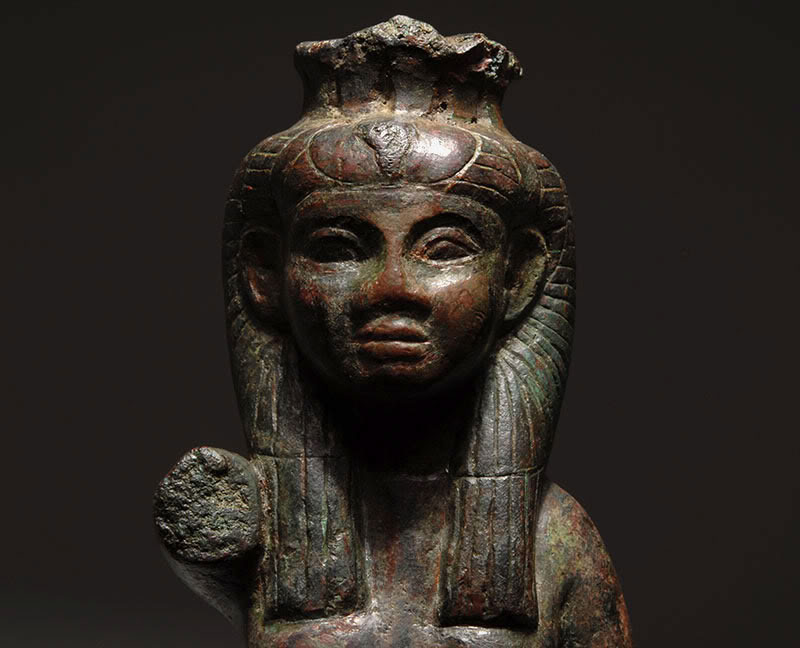
Now as with Amun whose home is supposedly Jebel Barkal , was acquired by Kush through conquest from further south, the Kemitians held sway there for a time, but before then the Ta Setians governed the area even before there was an Egypt , these were the people that held the gold producing regions or the land of gold called Nubia before other players.
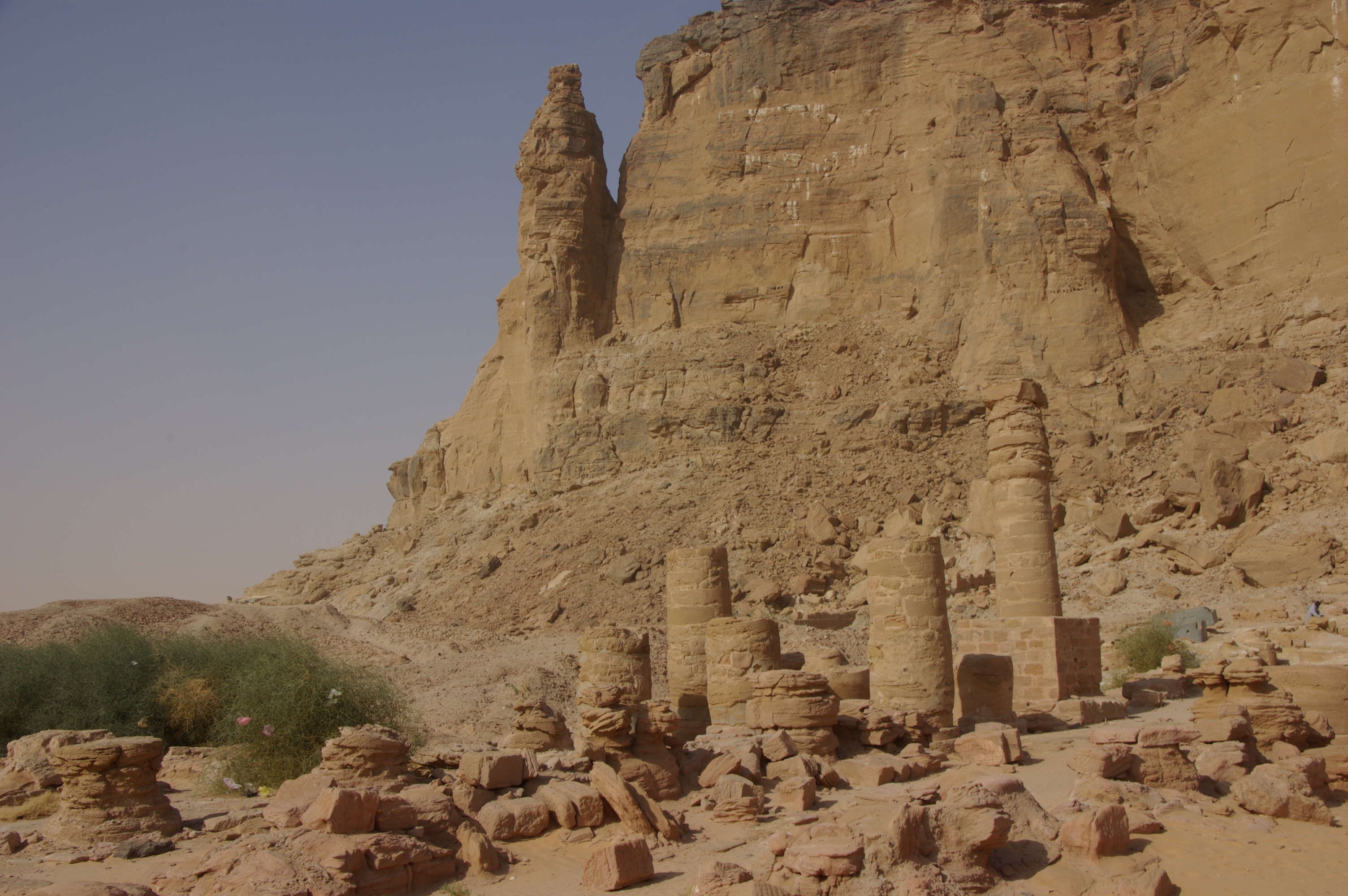
Jebel Barkal
See the head of a snake and vulture like other Nile valley royal head wear.
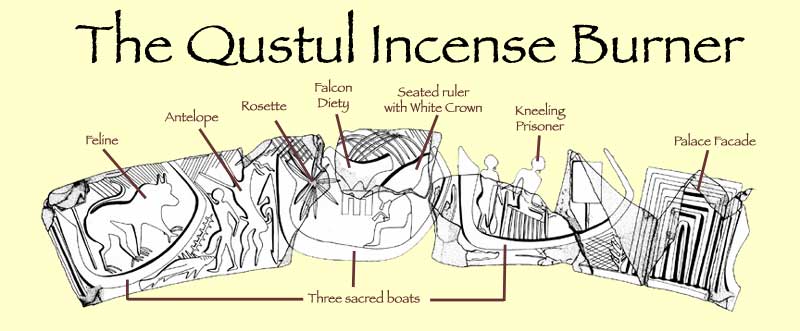
Ta-Seti king or pharaoh wearing the white crown.
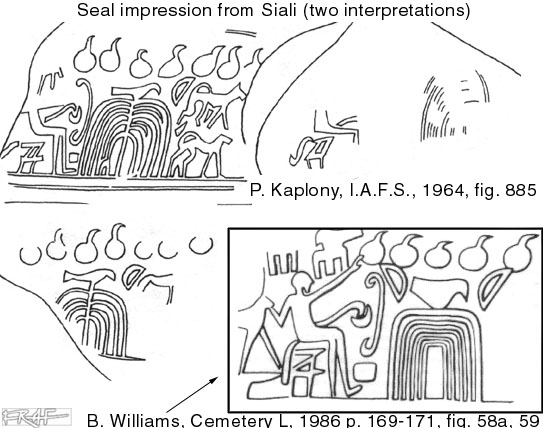
A man saluting the palace of a king mounted by Horus the falcon god, son of Aset and Ausar labeled by a bow, or Ta-Seti land of the bow aka Nubia.

Now as with Amun whose home is supposedly Jebel Barkal , was acquired by Kush through conquest from further south, the Kemitians held sway there for a time, but before then the Ta Setians governed the area even before there was an Egypt , these were the people that held the gold producing regions or the land of gold called Nubia before other players.

Jebel Barkal
See the head of a snake and vulture like other Nile valley royal head wear.

Ta-Seti king or pharaoh wearing the white crown.

A man saluting the palace of a king mounted by Horus the falcon god, son of Aset and Ausar labeled by a bow, or Ta-Seti land of the bow aka Nubia.
edit on 7-11-2016 by Spider879 because: (no reason given)
originally posted by: theantediluvian
a reply to: Spider879
So I'm guessing you read this from the Isiopolis site?
Yes, but they and others didn't give a link to the original document.
edit on 7-11-2016 by Spider879 because: (no reason given)
a reply to: Spider879
That's the most information any of them claim. The other iteration seems to be "in at least one ancient text." I'll help you look but my gut is telling me that it's sketchy as hell.
That's the most information any of them claim. The other iteration seems to be "in at least one ancient text." I'll help you look but my gut is telling me that it's sketchy as hell.
edit on 2016-11-7 by theantediluvian because: (no reason given)
originally posted by: theantediluvian
a reply to: Spider879
That's the most information any of them claim. The other iteration seems to be "in at least on ancient text." I'll help you look but my gut is telling me that it's sketchy as hell.
Thanks scholar..
a reply to: Spider879
This looks promising here.
EDIT:
ehh, maybe not.. Morgan, M (2011) The Ritual Year in Ancient Egypt, Mandrake of Oxford. Look's like the guy was quoting his book from some occult independent publisher. I can't really tell what the spell is supposed to be from. Author's email is in his profile at the publisher.
This looks promising here.
Extract from “Ritual Year In Ancient Egypt”
Hearing this the divine Isis said:
I am the Nubian woman
I have come down from heaven
I have come to realise the seed in the body
of every mother’s son and every mother’s daughter
And cause them to return in good health
For as Horus lives
So shall all live:
Morgan, M (2011) The Ritual Year in Ancient Egypt, Mandrake of Oxford
Pinch, G (1993) Votive Offerings to Hathor, Oxford
EDIT:
ehh, maybe not.. Morgan, M (2011) The Ritual Year in Ancient Egypt, Mandrake of Oxford. Look's like the guy was quoting his book from some occult independent publisher. I can't really tell what the spell is supposed to be from. Author's email is in his profile at the publisher.
edit on 2016-11-7 by theantediluvian because: (no reason given)
a reply to: theantediluvian
Thanks to you I am getting warmer, the link had me going to Unichicago pdf ,lots of text to go through before it may or may not pan out, but at least a scholarly source if it did.
Thanks to you I am getting warmer, the link had me going to Unichicago pdf ,lots of text to go through before it may or may not pan out, but at least a scholarly source if it did.
edit on 7-11-2016 by Spider879 because: (no reason given)
a reply to: Spider879
I haven't come up with anything better unfortunately but here's a couple notes from my search:
The "Great Lady of Nubia" might come from here:
The Metternich Stela (aka Magical Stela), which is at the Metropolitan Museum, contains a story of Isis that is something you might want to take a look at involving an incantation to counteract a poison:
Also, here you can see Isis referenced to as the "queen of every land."
Diodorus of Siculus gave an account of a stele of Isis in Nysa. This is a translation from the Greek:
I haven't come up with anything better unfortunately but here's a couple notes from my search:
The "Great Lady of Nubia" might come from here:
P. Garnsey, and C. R. Whittaker, Imperialism in the Ancient World: The Cambridge University Research Seminar in Ancient History (Cambridge UP, 1978) 37.
The Metternich Stela (aka Magical Stela), which is at the Metropolitan Museum, contains a story of Isis that is something you might want to take a look at involving an incantation to counteract a poison:
“‘Poison of Tefen, come forth, flow on the ground, do not penetrate, do not enter in. Poison of Befen, come forth on the ground. I am Isis the goddess, Mistress of Magic, who makes magic, glorious of speech. Every reptile who stings listens to me…Isis, great of magic before the gods, has spoken, to whom Geb has given his magic to repulse the poison. Be powerless, be repulsed, retreat, flee back, poison!’”(Scott 211).
Also, here you can see Isis referenced to as the "queen of every land."
Diodorus of Siculus gave an account of a stele of Isis in Nysa. This is a translation from the Greek:
"I am Isis, the queen of every land, she who was instructed of Hermes, and whatsoever laws I have established, these can no man make void. I am the eldest daughter of the youngest god Cronus; I am the wife and sister of the king Osiris; I am she who first discovered fruits for mankind; I am the mother of Horus the king; I am she who riseth in the star that is in the Constellation of the Dog; by me was the city of Bubastus built. Farewell, farewell, O Egypt that nurtured me."
a reply to: theantediluvian
Again thank you thank you, off course Isis was "Nubian" so it would be not be surprising to have her say “I am the Nubian and I have descended from heaven" because that's exactly who she was, as Philae is Nubia we often tend to forget that ancient "Nubia" did not stop at the Sudan but extended quite far into Egypt itself, and made an open city during Greco Roman times for Isis worshipers from all over, as this was during that era the quote might have stemmed from or of Nectanebo II, if she was called Nubian and not Ta-Nahasi ..
Again thank you thank you, off course Isis was "Nubian" so it would be not be surprising to have her say “I am the Nubian and I have descended from heaven" because that's exactly who she was, as Philae is Nubia we often tend to forget that ancient "Nubia" did not stop at the Sudan but extended quite far into Egypt itself, and made an open city during Greco Roman times for Isis worshipers from all over, as this was during that era the quote might have stemmed from or of Nectanebo II, if she was called Nubian and not Ta-Nahasi ..
a reply to: Spider879
I'm literally about to go out the door but I did a quick search for your term. British museum came up with these. I haven't looked at any of them as short on time, but will have a go later.
Egyptian healing texts
I'm literally about to go out the door but I did a quick search for your term. British museum came up with these. I haven't looked at any of them as short on time, but will have a go later.
Egyptian healing texts
There are four sources for that quote on the internet, they all lead back to the Isiopolis website
That's as good as saying it originated there and isn't a genuine quote.
Unless you think that the spiritualist who writes that site has been given access to the British Museums back room and also can read Egyptian. Which is about as likely as Donald Trump turning out to be good for minorities...
Genuine quotes, its easy to find the source, even my Google Fu failed on this and when that fails, it doesn't exist
It is well known that Isis was referred to as "the Great lady of Nubia", but is even more well known that the cultural diffusion went from Egypt to Nubia, rather than the other way round.
examples
That's as good as saying it originated there and isn't a genuine quote.
Unless you think that the spiritualist who writes that site has been given access to the British Museums back room and also can read Egyptian. Which is about as likely as Donald Trump turning out to be good for minorities...
Genuine quotes, its easy to find the source, even my Google Fu failed on this and when that fails, it doesn't exist
It is well known that Isis was referred to as "the Great lady of Nubia", but is even more well known that the cultural diffusion went from Egypt to Nubia, rather than the other way round.
examples
edit on 7-11-2016 by Marduk because: (no reason given)
a reply to: Marduk
Yes cultural influences did traveled to so called Nubia at a later period , but what do we mean when we say "Nubia" because the issue is very complex and can be confusing, as I said above the very first Pharoanic state complete with all the royal paraphernalia of the successor Egyptian state, was Ta-Seti land of the Bow or Nubia land of gold, it was among this group that the Horus kings came from, Nekhen is where they began to diverge, and Ta-Seti became the first nome or district of Egypt.
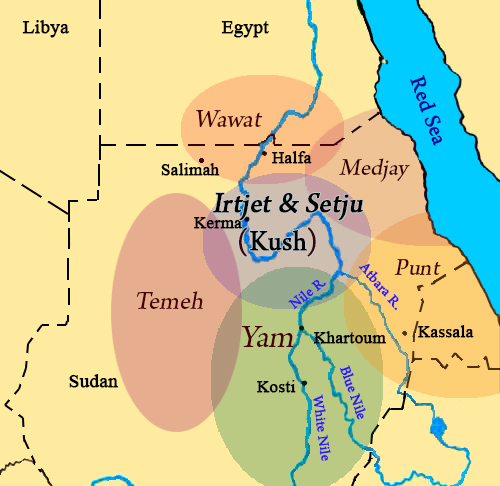
Different competing polities and States, only the Madjay was friendly to Kmt and the Puntities great trading partners .
Across the shifting border the disgruntled defeated faction or rebels set up another state called Wawat the newly form upper Egyptian state had to contend with, other states and polities existed beyond that the most important being Kush , being very different, this state would take over all others and came to logger head with the Kemetian state itself, however, regardless of whose in control Amun's birth place was in their newly acquired land formally part of Ta Seti , if Horus is a God of Ta-Seti then so was his mom Isis so that's why Philae today's "Egyptian Nubia" was important.
The northerly faction of them would came under control of the Kemetian state , they having invaded Kmt itself and playing footsies with the Hyksos kings, this is when Egyptian influence began.
archive.archaeology.org...
xoomer.virgilio.it...
www.academia.edu... drawings_of_Nag_el-Hamdulab_Aswan_._Antiquity_86_334_2012_1068-1083
It is well known that Isis was referred to as "the Great lady of Nubia", but is even more well known that the cultural diffusion went from Egypt to Nubia, rather than the other way round
Yes cultural influences did traveled to so called Nubia at a later period , but what do we mean when we say "Nubia" because the issue is very complex and can be confusing, as I said above the very first Pharoanic state complete with all the royal paraphernalia of the successor Egyptian state, was Ta-Seti land of the Bow or Nubia land of gold, it was among this group that the Horus kings came from, Nekhen is where they began to diverge, and Ta-Seti became the first nome or district of Egypt.

Different competing polities and States, only the Madjay was friendly to Kmt and the Puntities great trading partners .
Across the shifting border the disgruntled defeated faction or rebels set up another state called Wawat the newly form upper Egyptian state had to contend with, other states and polities existed beyond that the most important being Kush , being very different, this state would take over all others and came to logger head with the Kemetian state itself, however, regardless of whose in control Amun's birth place was in their newly acquired land formally part of Ta Seti , if Horus is a God of Ta-Seti then so was his mom Isis so that's why Philae today's "Egyptian Nubia" was important.
The northerly faction of them would came under control of the Kemetian state , they having invaded Kmt itself and playing footsies with the Hyksos kings, this is when Egyptian influence began.
archive.archaeology.org...
xoomer.virgilio.it...
www.academia.edu... drawings_of_Nag_el-Hamdulab_Aswan_._Antiquity_86_334_2012_1068-1083
edit on 7-11-2016 by Spider879 because: Change crappy
map.
edit on 7-11-2016 by Spider879 because: (no reason given)
extra DIV
originally posted by: Marduk
originally posted by: Spider879
a reply to: Marduk
but what do we mean when we say "Nubia"
Nubia is a region along the Nile river located in what is today northern Sudan and southern Egypt.
Its that simple
And I am saying it's not that simple from the POV of the ancient Egyptians, you are into what's called Mesopotamian history and culture, the ancient Elamites and Sumerians didn't go around saying they are Mesopotamians , they recognize where they overlap in relation to culture etc and where they differed and could be deadly enemies to each other, there is no lump and dump , Nubia for the Kemetians was a very specific area associated with gold and later to become their first state.
Ta- Nahasi did not equal "Nubia" although they sometimes overlap, example the Kush and people of Yam were not Nubians although most folks insist on calling them that.
originally posted by: Spider879
And I am saying it's not that simple from the POV of the ancient Egyptians, you are into what's called Mesopotamian history and culture, the ancient Elamites and Sumerians didn't go around saying they are Mesopotamians ,.
Really my area of expertise is the development of religion in the Holocene, I just seem to know more about Mesopotamia because by comparison, no one else does.
originally posted by: Spider879
a reply to: theantediluvian
Again thank you thank you, off course Isis was "Nubian" so it would be not be surprising to have her say “I am the Nubian and I have descended from heaven" because that's exactly who she was, as Philae is Nubia we often tend to forget that ancient "Nubia" did not stop at the Sudan but extended quite far into Egypt itself, and made an open city during Greco Roman times for Isis worshipers from all over, as this was during that era the quote might have stemmed from or of Nectanebo II, if she was called Nubian and not Ta-Nahasi ..
Actually, she was never depicted as Nubian to the best of my knowledge, though anyone who was Nubian was presented as such. Bes seems to be Nubian but Isis and Osiris don't seem to have any relation to Nubia.
And, of course, Amun was originally a Nubian deity.
Edited to add: don't put too much stock in the "families" of gods because they changed constantly. Horus was sometimes a father, sometimes a brother, sometimes a child, sometimes a grandchild... and in conflicting ways.
edit on 12-11-2016 by Byrd because: (no reason given)
originally posted by: Byrd
originally posted by: Spider879
a reply to: theantediluvian
Again thank you thank you, off course Isis was "Nubian" so it would be not be surprising to have her say “I am the Nubian and I have descended from heaven" because that's exactly who she was, as Philae is Nubia we often tend to forget that ancient "Nubia" did not stop at the Sudan but extended quite far into Egypt itself, and made an open city during Greco Roman times for Isis worshipers from all over, as this was during that era the quote might have stemmed from or of Nectanebo II, if she was called Nubian and not Ta-Nahasi ..
Actually, she was never depicted as Nubian to the best of my knowledge, though anyone who was Nubian was presented as such. Bes seems to be Nubian but Isis and Osiris don't seem to have any relation to Nubia.
And, of course, Amun was originally a Nubian deity.
Edited to add: don't put too much stock in the "families" of gods because they changed constantly. Horus wa sometimes a father, sometimes a brother, sometimes a child, sometimes a grandchild... and in conflicting ways.
Well depends, sometime she was, Bes was not Nubian he came from the area of the Great Lakes, and was most likely a Batwa or Akka, remember Pepi's II trade expedition.
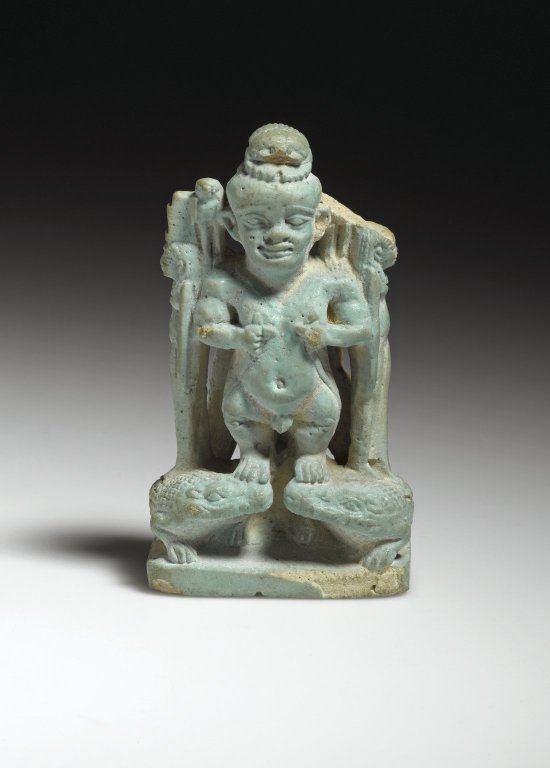
Figure of Pataikos Very high-quality and expensive faience amulets were made in all periods. In this amulet, the dwarf god Pataikos strangles snakes while standing on two crocodiles. A scarab, a beetle associated with the sun god, rests on his head. He is flanked by Isis and Nephthys, the wife and sister of Osiris. The back of the amulet is a ba-bird, part of the soul of the deceased. This amulet, worn with a cord around the neck, protects the deceased from snakes and crocodiles in the afterlife. Pataikos has connections to the dwarf god Bes and to the god Horus the child, who also stands on crocodiles. But he seems to be a separate entity.
www.brooklynmuseum.org...
a reply to: Spider879
Patrikos is a much younger deity than Bes and may be derived from him (as you can tell from the Greek name). Isis is not attested in Nubia early on.
Isis is first attested in Nesurure's inscriptions and he's from Abusir (with his capital in Memphis in the Delta.) There are no earlier depictions of Isis to the south.
Patrikos is a much younger deity than Bes and may be derived from him (as you can tell from the Greek name). Isis is not attested in Nubia early on.
Isis is first attested in Nesurure's inscriptions and he's from Abusir (with his capital in Memphis in the Delta.) There are no earlier depictions of Isis to the south.
originally posted by: Byrd
a reply to: Spider879
Patrikos is a much younger deity than Bes and may be derived from him (as you can tell from the Greek name). Isis is not attested in Nubia early on.
Isis is first attested in Nesurure's inscriptions and he's from Abusir (with his capital in Memphis in the Delta.) There are no earlier depictions of Isis to the south.
Ok I understand that, but Memphis was founded by Mene or Narmer and was a purpose built city , but he himself bought the Osiris crown and all that it implied about that deity to the north his northern capitol , although the city was dedicated to Ptah lord of Memphis another Pygmy deity.
new topics
-
Advice for any young Adult .
General Chit Chat: 28 minutes ago -
Joe meant what he said about Hunter's pardon....
US Political Madness: 1 hours ago -
Regent Street in #London has been evacuated due to a “bomb threat.”
Other Current Events: 1 hours ago -
It’s Falling…
Philosophy and Metaphysics: 3 hours ago -
Steering the Titantic from the Drydock.
Rant: 6 hours ago
top topics
-
Steering the Titantic from the Drydock.
Rant: 6 hours ago, 10 flags -
Hearing more ambulances lately
Medical Issues & Conspiracies: 17 hours ago, 8 flags -
Los Angeles brush fires latest: 2 blazes threaten structures, prompt evacuations
Mainstream News: 17 hours ago, 7 flags -
Paramilitary Leaks - John Williams
Whistle Blowers and Leaked Documents: 15 hours ago, 7 flags -
Joe meant what he said about Hunter's pardon....
US Political Madness: 1 hours ago, 7 flags -
It’s Falling…
Philosophy and Metaphysics: 3 hours ago, 4 flags -
Advice for any young Adult .
General Chit Chat: 28 minutes ago, 4 flags -
Some sausage, some chicken, some sauce, some onions and some garlic...and some peppers!
Food and Cooking: 16 hours ago, 3 flags -
Regent Street in #London has been evacuated due to a “bomb threat.”
Other Current Events: 1 hours ago, 3 flags
active topics
-
Regent Street in #London has been evacuated due to a “bomb threat.”
Other Current Events • 2 • : Vermilion -
Los Angeles brush fires latest: 2 blazes threaten structures, prompt evacuations
Mainstream News • 20 • : BeyondKnowledge3 -
Advice for any young Adult .
General Chit Chat • 2 • : ColeYounger2 -
Joe meant what he said about Hunter's pardon....
US Political Madness • 7 • : ColeYounger2 -
Steering the Titantic from the Drydock.
Rant • 31 • : schuyler2 -
Russia Ukraine Update Thread - part 3
World War Three • 6902 • : Oldcarpy2 -
It’s Falling…
Philosophy and Metaphysics • 2 • : JJproductions -
Hearing more ambulances lately
Medical Issues & Conspiracies • 4 • : JJproductions -
Meta Llama local AI system is scary good
Science & Technology • 51 • : imitator -
Judge rules president-elect Donald Trump must be sentenced in 'hush money' trial
US Political Madness • 65 • : network dude
3

